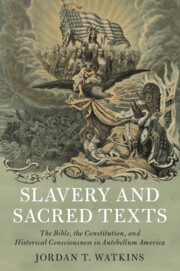 Slavery and Sacred Texts
Slavery and Sacred Texts Published online by Cambridge University Press: 12 June 2021
The epilogue indicates continuities and changes in American historical thought, highlighting the persistence of the ways in which politics inform historical awareness, and also showing that Americans continue to read the Constitution and the Bible in spite of – or in light of – historical awareness. While drawing attention to these continuities, the epilogue emphasizes differences in thought as well, particularly the fact that Americans today are more likely than their antebellum predecessors to engage in or to be confronted by conversations revolving around ahistorical and historical thinking. Twenty-first-century historical consciousness can be seen in aspirationalist readings of the Constitution and approaches to the Bible that deliberately account for historical distance. In attending to both continuities and changes, the epilogue underscores Americans’ continued efforts to bridge the meaning of founding documents to our new times, while also emphasizing the limitations of these approaches. A focus on the founders has allowed white Americans to avoid fully confronting the facts of slavery and racial prejudice in our past and, as a result, in our present.
To save this book to your Kindle, first ensure no-reply@cambridge.org is added to your Approved Personal Document E-mail List under your Personal Document Settings on the Manage Your Content and Devices page of your Amazon account. Then enter the ‘name’ part of your Kindle email address below. Find out more about saving to your Kindle.
Note you can select to save to either the @free.kindle.com or @kindle.com variations. ‘@free.kindle.com’ emails are free but can only be saved to your device when it is connected to wi-fi. ‘@kindle.com’ emails can be delivered even when you are not connected to wi-fi, but note that service fees apply.
Find out more about the Kindle Personal Document Service.
To save content items to your account, please confirm that you agree to abide by our usage policies. If this is the first time you use this feature, you will be asked to authorise Cambridge Core to connect with your account. Find out more about saving content to Dropbox.
To save content items to your account, please confirm that you agree to abide by our usage policies. If this is the first time you use this feature, you will be asked to authorise Cambridge Core to connect with your account. Find out more about saving content to Google Drive.